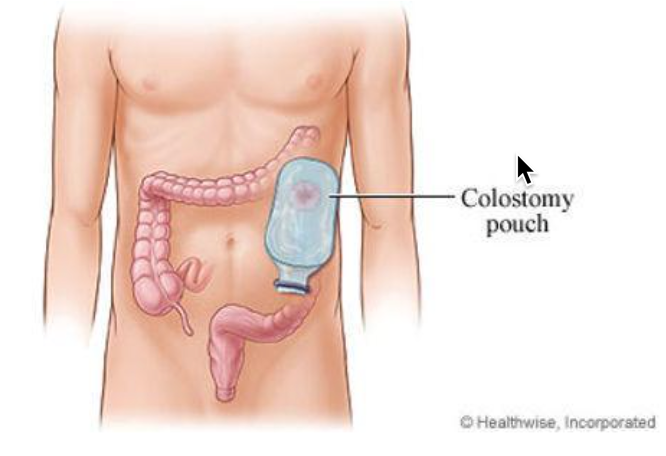Cancer Community Nippising
Colorectal Cancer
Summary
Cancer Community Nipissing is designed to help you find local resources for colorectal cancer screening, treatment, and support throughout your cancer journey. We've included basic information to help you understand the condition and connect with services available in our region. For more in-depth information about colorectal cancer, please visit one of the trusted online resources we recommend.
If you know of additional local resources we’ve missed, please
let us know. Your updates are important to us!
Colorectal Cancer: Why do I need to know about this?
Colorectal cancer is the second most commonly diagnosed cancer in Canada and ranks as the second leading cause of cancer-related death in men and the third in women.
In its early stages, the cancer is typically small, and seven out of ten people diagnosed experience no symptoms. Symptoms usually emerge as the tumor grows, often resembling those of other health conditions.
Because of this, early detection through colon cancer screening is crucial for identifying the disease before it progresses.
Colorectal Cancer Screening
What is colorectal screening and when should I be screened?
Colorectal screening helps detect colorectal cancer or precancerous polyps in individuals without symptoms. It is recommended based on age and risk factors and may involve a stool test (FIT: fecal immunochemical test) or a colonoscopy.
Your physician will assess whether you are at average or increased risk to determine the appropriate screening method and timing.
Low Risk Screening
FIT (fecal immunochemical test) - accessible everywhere
Who is it for?
The FIT test is intended for individuals at average risk, meaning:
- Ages 50 to 74 with no first-degree relative diagnosed with colorectal cancer
- No personal history of polyps
- No inflammatory bowel disease
This test is not recommended for individuals experiencing symptoms. Those with symptoms should proceed directly to a colonoscopy.
How do I get a FIT?
The government will send a notice to you in the mail when you turn 50 to remind you to get started. Once in the program a reminder to ask for another test will be mailed to you 2 years after each test is submitted.
Do you have a family doctor or access to primary care?
Speak with your healthcare provider, who can request a FIT kit to be mailed to you through the Ontario government.
You don’t have access to a family doctor or primary care?
If you have no primary care then you can call Health811 or Telehealth Ontario.
- Call Health811 at 811 or Telehealth Ontario at 1-866-828-9213
- Speak with someone who will assess your eligibility
- If eligible, you will receive a FIT kit in the mail
How to complete the FIT kit:
- Collect a sample (stool)
- Mail the completed test back to LifeLabs using the prepaid envelope
- Or drop it off at a LifeLabs Patient Service Centre
What happens after I complete the test?
- Ontario Health (Cancer Care Ontario) will mail you a letter with your test results
- Your family doctor or nurse practitioner will also get a copy of your result
What if the result is positive?
A positive result means blood was detected in your stool, but it does not necessarily indicate cancer. It simply places you in a higher-risk group that may require further testing.
A colonoscopy is the next step to examine the bowel more closely. Your healthcare provider will submit a request for this procedure. An abnormal FIT result should be followed up with a colonoscopy within eight weeks.
High Risk Screening
Colonoscopy - Available at North Bay, Sturgeon Falls, and New Liskeard Hospitals
A colonoscopy is a procedure that uses a thin, flexible scope with a camera to examine the large intestine. To ensure clear visibility, the bowel must be completely empty, requiring fasting and a special preparation to cleanse it beforehand.
In our community, sedatives are provided to put you to sleep during the procedure. If polyps or tumours are detected, a sample is taken and sent for testing to determine whether the tissue is normal or cancerous.
Colonoscopy is the recommended test for individuals with a positive FIT result or those at increased risk due to symptoms or family history.
When Should You Have a Colonoscopy Instead of a FIT?
A colonoscopy is recommended instead of FIT if you have:
- A personal or family history of colorectal cancer (a first-degree relative diagnosed before age 60 or two second-degree relatives diagnosed before age 60)
- A personal or family history of polyps
- A personal history of inflammatory bowel disease (Crohn’s disease or ulcerative colitis)
When should Colonoscopy screening begin?
Screening should begin at 50 years of age or 10 years earlier than the age their relative was diagnosed, whichever comes first.
How do I get a colonoscopy?
Colonoscopies are done by the general surgeons and the gastroenterologists at a hospital. You need to be referred by a primary care provider or specialist.
What Happens if Colon Cancer or a Suspicious Growth is Found?
If colon cancer or a possible case is identified, further testing will be arranged by your family doctor, general surgeon, or gastroenterologist, depending on who made the discovery.
CT Scan & Bone Scan (Available Locally – North Bay Regional Health Centre)
These imaging tests help determine if the cancer has spread beyond the colon:
- CT scan assesses soft tissues
- Bone scan checks for cancer spread to the bones
A CT scan or bone scan may be ordered after a colon cancer diagnosis. In some cases, a CT scan is the first test to detect potential cancer, leading to a colonoscopy or surgery for a biopsy to confirm the diagnosis.
Treatment Options for Colorectal Cancer
The treatment approach for colorectal cancer depends on several factors, including the tumor’s size, location, stage, recurrence status, and the patient’s overall health.
Colorectal Surgery
Learn More About SurgeryThe most common treatment. The tumor and nearby lymph nodes are removed to prevent further spread and determine the cancer stage. The type of surgery depends on the disease extent and tumor location. Surgery is available at North Bay Regional Health Centre.
Chemotherapy
Learn More About ChemotherapyA systemic treatment that uses medication to destroy cancer cells throughout the body. It is administered either orally (pills) or intravenously. If chemotherapy is needed, you will be referred to the North East Cancer Centre in Sudbury to consult a Medical Oncologist.
Radiation Therapy
Learn More About Radiation TherapyUses high-energy beams to destroy cancer cells by damaging their DNA, preventing further growth. Radiation is a localized treatment targeting the tumor area. If required, your surgeon will refer you to the North East Cancer Centre in Sudbury to see a Radiation Oncologist.
Colostomy/Ileostomy
Not everyone with bowel cancer requires a colostomy or ileostomy, but in some cases, it is a necessary part of treatment.
An ostomy is a surgically created opening in the abdomen that allows for stool to be expelled from the body. Whether a colostomy or ileostomy is temporary or permanent depends on the type of surgery performed, your overall health, and the extent of the disease found during the procedure.
Your surgeon will discuss the possibility of needing an ostomy with you during your consultation.
What is an Ostomy?
An ostomy is a surgically created opening in the abdomen in which a piece of the bowel is brought to the abdominal wall to create a stoma (opening) through which digested food passes into an external ostomy bag.

Types of Ostomies
Ostomies can be either temporary or permanent, depending on the condition of the bowel and the required treatment.
Temporary Ostomy
Created to allow a portion of the bowel to rest and heal. Once healing is complete, the ostomy can be reversed, and normal bowel function restored.
Permanent Ostomy
Necessary when part of the colon or rectum is severely diseased and must be removed or permanently bypassed. In this case, the ostomy remains in place indefinitely and is not expected to be reversed.
What to Expect After Getting an Ostomy
After surgery, a pouching system is typically worn over the ostomy. These pouches are odor-free and available in both disposable and reusable options to suit different lifestyles.
Hospital Care & Support
While in the hospital, an ostomy nurse will assist you in selecting the right supplies and teach you how to care for your ostomy.
The nurse will also register you with Ontario Health atHome and guide you through applying for the Government Grant for ostomy supplies.
Hone Care & Follow-Up
After discharge, a nurse from Ontario Health atHome will visit within two weeks to check on your recovery and assist with changing your appliance.
The nurse will continue to visit for six weeks until you can manage independently.
Need Assistance?
If you need medical help before your scheduled visit, you can contact:
- Ostomy nurses at North Bay Regional Health Centre (NBRHC)
- Ontario Health at Home
- Visit the Emergency Department for immediate medical attention.
A follow up appointment with your surgeon will be scheduled in four weeks post surgery.
Finding Your Ostomy Supplies
While in the hospital, you will be fitted with products suited to your specific ostomy. However, once you are home and more comfortable, you may choose to explore different products for better comfort and discretion.
Where to Find Supplies & Support:
- Local retailers supply ostomy products and offer support.
- Some pharmacies have trained staff who can provide advice, resources, and help you select the best product.
- If you experience issues with your pouch or flange, pharmacy staff can suggest alternatives and recommend accessories to improve fit and function.
For ostomy supplies and support, you can visit the following locations:
Algonquin Pharmasave
Wellwise
Robinson's Pharmasve
Ostomy Supply Companies & Support Service
Several companies not only supply products to retailers but also provide personalized care and ongoing support to clients. Registering with one or more of these companies ensures you have access to continued assistance for your ostomy care.
These companies are often staffed with nurses who can:
- Answer your questions and provide expert advice
- Recommend the best products for your stoma
- Offer general guidance, free product samples, and educational resources
Since most companies provide similar products and services, choosing the right one comes down to personal preference and what works best for your needs.
Convatec Canada
 Learn More at convatec.com
Learn More at convatec.comConvatec is a global medical products and technologies company focused on therapies for the management of chronic conditions, leading in advanced wound care, ostomy care, continence and fecal incontinence.
Discover a pouching system to meet your needs, the technology that makes our products different and our range of accessories designed to enhance your bond with your ostomy.
Coloplast Canada
 Learn More at coloplast.ca
Learn More at coloplast.caColoplast is one of the world's leading manufacturers of ostomy care products. Our "listen and respond" approach to product innovation enables us to produce ostomy appliances and supporting products that set the bar in ostomy care - helping ostomates around the world to live life to the full.
Hollister Canada
 Learn More at hollister.ca
Learn More at hollister.caHollister Incorporated is an independent, employee-owned company that develops, manufactures, and markets healthcare products and services worldwide.
We offer advanced medical products for Ostomy Care, which includes two strong global brands – Hollister Ostomy and Dansac Ostomy; Continence Care; and Critical Care. We also provide innovative healthcare programs and services, as well as educational materials for patients and healthcare professionals.
Funding for Ostomy Supplies
The Government of Ontario’s Ostomy Grant is available to Ontario residents who require an ostomy for more than six months.
The North Bay General Surgery office has the necessary paperwork and can assist with completing the forms.
Those who qualify may receive assistance through the Assistive Devices Program (ADP) provided by the Ontario Government.
Another resource is
Ostomy Canada.
Support & Information
Ostomy Canada Society
 Visit ostomycanada.ca
Visit ostomycanada.caManaging an ostomy can feel overwhelming. Whether you have a new stoma, or you’ve been here before, Ostomy Canada can help. For over 60 years, we’ve been there for thousands of Canadians with an ostomy, helping them live life to the fullest.
Canadian Cancer Society
 Visit cancer.ca
Visit cancer.caWe provide nationwide support for people with cancer, their loved ones, and caregivers. Connect with our online community, speak with information specialists, and access services to help manage life with cancer.
North Bay and Area Ostomy Support Group
Learn More at northeasthealthline.caProvides community support for all individuals with colostomy, ileostomy and urostomy.


